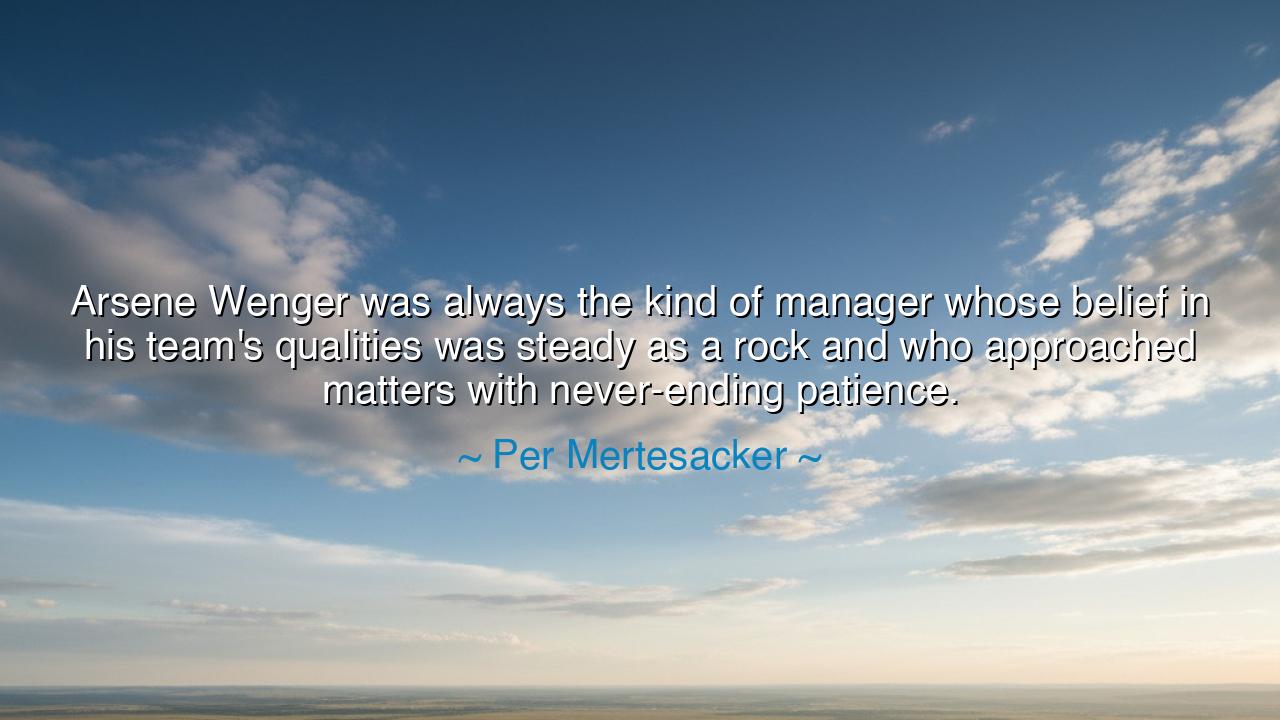
Arsene Wenger was always the kind of manager whose belief in his
Arsene Wenger was always the kind of manager whose belief in his team's qualities was steady as a rock and who approached matters with never-ending patience.






Hear the tribute of Per Mertesacker, who bore the Arsenal crest upon his chest, speaking of his mentor: “Arsene Wenger was always the kind of manager whose belief in his team’s qualities was steady as a rock and who approached matters with never-ending patience.” These words are not only a reflection of one man, but a testament to the enduring virtues of leadership—faith, steadiness, and endurance through trials. Wenger, in the eyes of those who served under him, embodied the ancient ideal of the guide who does not falter, even when storms rage and critics roar.
The heart of this saying lies in belief—that unshakable confidence in others that strengthens their courage when they doubt themselves. Many managers, many leaders, crumble when their people falter, turning against them or losing trust in their potential. But Wenger, as Mertesacker recalls, remained as steady as a rock, unyielding in his conviction that his players carried within them the fire to rise again. This is the faith of a true leader: not to praise in times of triumph alone, but to stand firm in times of failure, when faith is most needed.
And what of patience? It is the companion of belief. Wenger was known not for hasty judgment or rash decisions, but for the long vision of growth. He nurtured the young, he endured barren seasons without trophies, he trusted the process when others demanded instant results. This patience, Mertesacker reminds us, was not weakness but strength, for it takes greater courage to wait upon a harvest than to demand fruit from unripe seed. Such never-ending patience is the mark of those who build for eternity, not merely for today.
History gives us mirrors of this truth. Consider Pericles of Athens, who led his city not through sudden conquest alone but through decades of patient building, fostering culture, philosophy, and art until Athens became the light of Greece. Or think of Abraham Lincoln, who through long and weary years held his belief in the Union steady, even as his nation tore itself apart. Like Wenger, these leaders endured storms not with haste but with endurance, trusting that time and steadfastness would vindicate their vision.
For Wenger’s Arsenal was not merely a team of footballers, but a reflection of this philosophy. He cultivated talent where others sought to buy it, he looked for beauty in the game when others prized brute strength. To many, this patience was folly; to his players, it was salvation. For when a man of stature like Wenger looks upon you with unwavering faith, you rise, you strive, you become greater than you thought possible. This is why Mertesacker, a warrior of the pitch, speaks of him with reverence—for he was not only a manager, but a father of confidence and calm.
The lesson, O seekers of wisdom, is this: to lead is not to demand constant victory, but to nurture constant growth. To believe in others when they stumble is to give them wings when their own legs fail. To practice patience in a world that clamors for speed is to choose the harder, nobler path, one that leaves a legacy beyond trophies or monuments. Such leadership endures, not because it is easy, but because it is grounded in faith deeper than circumstance.
Practical counsel is this: in your own life, whether you guide a team, a family, or even your own self, strive to be steady as a rock. Do not let setbacks shake your confidence, and do not let impatience blind you to the long road of growth. Encourage those around you, believe in their hidden strength, and wait with patience as their seeds of potential take root. In doing so, you will not only raise others, but you will carve your name into their hearts, as Wenger carved his into the memory of his players.
So let Mertesacker’s words resound as both tribute and teaching: “He was a man of belief, steady as a rock, with never-ending patience.” For such qualities are rare, yet they are the true foundation of greatness. Aspire to them, practice them, and you too may lead with calm in chaos, with strength in weakness, and with a vision that endures beyond the fleeting praise of the crowd.






AAdministratorAdministrator
Welcome, honored guests. Please leave a comment, we will respond soon